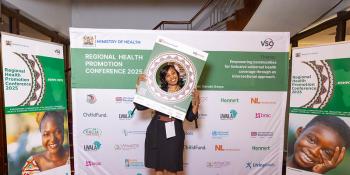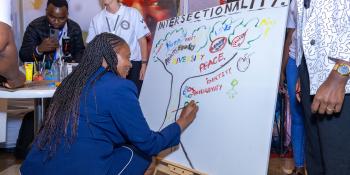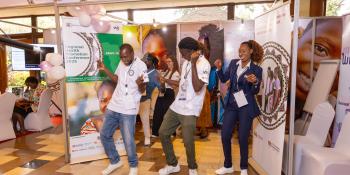"To people who are supporting VSO, I want to tell them they’re helping the youth in Uganda."Whycliffe RutalemwaVSO-supported vocational training graduate
More than three quarters of Ugandans are under 30. This huge youth population has the potential to lift the country out of poverty, but only if rampant levels of unemployment could be brought down.
VSO is working to prepare young people like Whycliffe Rutalemwa, 24, for new opportunities to work in oil and gas, and other growing industries. He shares his story of how he went from unemployed and struggling, to thriving:
Stifled dreams
Growing up I wanted to be a doctor. My grandfather was a doctor, and I wanted to be like him, but I did not get the opportunity.
In Uganda we have the problem of poverty. I grew up in a slum where most of the youth are addicted to drugs because there is no employment. I was raised by extended family and they had no funds to support all of us, so that’s how I ended up failing to achieve my dream.
I did not go to the best schools so I lacked the grades for university. I said to myself, if not a doctor, let me become an accountant. I felt like I should be going for white-collar jobs - that’s where I expected I would get a decent income. I joined a business school to study for a diploma in business administration. I was there for a year, but then we didn't have the money to continue paying for tuition and I had to drop out.
The struggle to succeed
I ended up out on the streets looking for work, any work. I started suffering doing hard, physical jobs. I was working carrying heavy loads for little money. Most of the people doing that kind of work get through it only by taking drugs, so that is the life I was facing.
Eventually, I got the opportunity of a government sponsorship to complete a certificate in welding - but after studying I was still unemployed. Many people had studied the same certificate as me and I couldn't get a job.
A turning point
Thanks to VSO I got the opportunity to study for City & Guilds accreditation, which is an internationally recognised qualification. I can work in any company within the world. When I got my certificate, I felt great.
It has changed my life. I have gone from someone who was nothing, to earning at least 850,000 UGX [£168] per month from the work I’m getting. Indirectly I’m earning even more than that because I have been able to invest in a plot and run a tree nursery, and I’m also operating a small barbershop in the village.
I’m employing three people permanently to help me run my businesses, and there are others who are doing casual work. I’m also supporting my five-year-old son and my young sister who is training to be a nurse.
I’m so grateful to VSO for giving me the opportunity because I thought life had ended, but life has just begun.
A desire to give back
My dream is to begin a big metal workshop in town so that I can employ the untrained youth there – those youth who don’t get a chance, the school drop-outs the drug-addicted youth; I want to train them on the job in my workshop.
Growing up in a Christian family, I grew up with the spirit of helping. So when I saw VSO with its goals, I saw we had the same vision, and I liked it. Growing up in a place where most of the youth are addicted to drugs, and the children are school, I want to make a change in the world.
My other ambition is to do volunteer work. I have seen lots of VSO volunteers come here – they are quality, they are very kind people, and they’re humanitarians.
Changing attitudes
In Uganda we used to think vocational training is something that is supposed to be done by people who are very poor, who have lost hope of something better, but with the coming in of VSO, obviously it’s changed our attitude.
First of all, VSO went into the communities, telling them the good things involved in vocational studying. They went on providing us with skills. When they took me in, and I got the certification, it changed my view, and even more so when I started earning money.
I started earning a lot more than my brothers. For example my brother has a Master’s in business – he’s still at home, miserable because he has no work. Meanwhile I’m earning and I’m even able to support him. He now wants to come back to vocational study and be an engineer like me.
Now people are looking at me as a role model. Meaning, if I can do it, they can do it. So all in all, I am grateful. It’s like a dream come true because I dreamed of being somebody people would admire.
Read more

In photos: Our Regional Health Promotion Conference 2025
Check out some of our favourite photos from Regional Health Promotion Conference (RHPC25). This event sought to reimagine Universal Health Coverage through the lens of intersectionality.

Using intersectionality to create healthy beginnings and hopeful futures
World Health Day brings global attention to the urgent need to end preventable maternal and newborn deaths. Learn more about how our Regional Health Promotion Conference is tackling these issues head on.

Highlights from the Regional Health Promotion Conference 2025
The Regional Health Promotion Conference 2025 reimagined Universal Health Coverage (UHC) through the lens of intersectionality, by bringing together experts from across East Africa and beyond.
